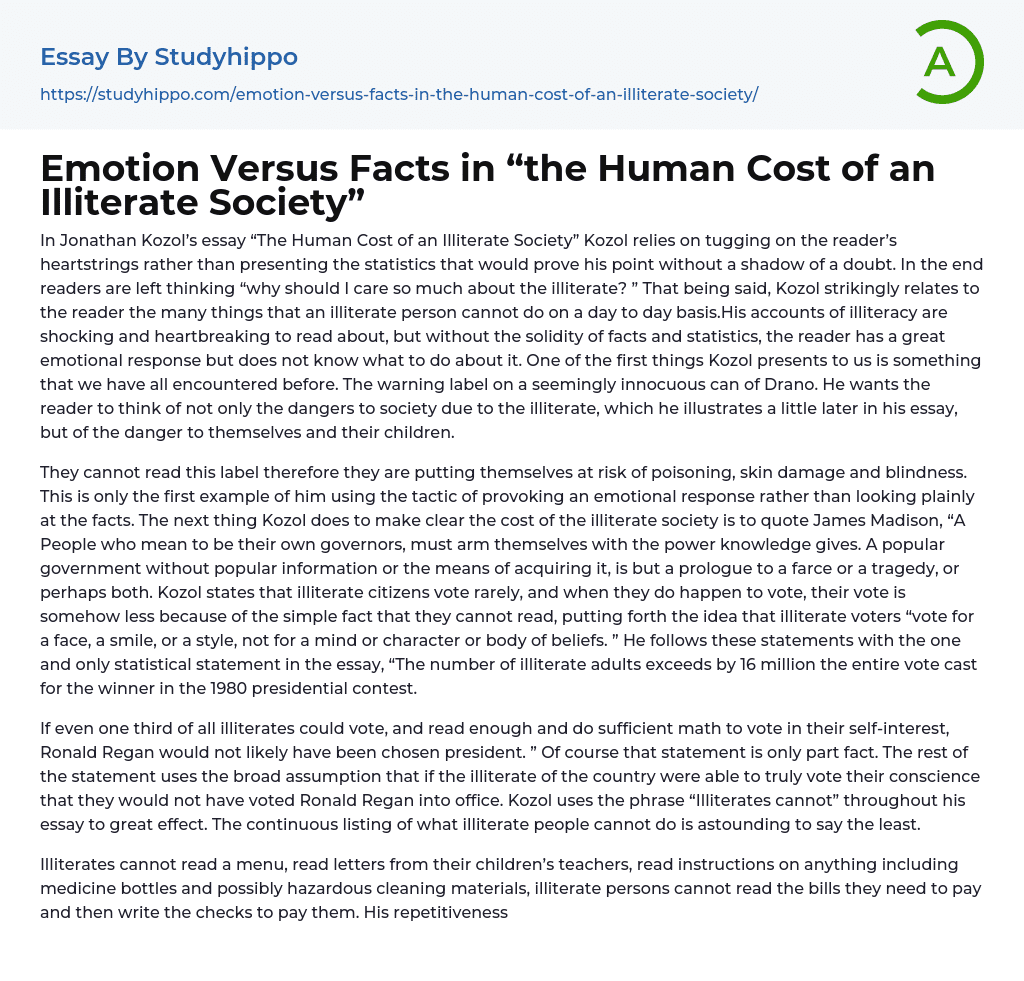

Emotion Versus Facts in “the Human Cost of an Illiterate Society” Essay Example
Jonathan Kozol utilizes emotional appeals in his essay, "The Human Cost of an Illiterate Society," instead of providing concrete statistics to support his argument. Thus, readers may question the importance of caring about illiteracy. Nevertheless, Kozol vividly portrays the daily struggles an illiterate person endures. While his descriptions of illiteracy are poignant, they lack factual evidence. Kozol first brings attention to the warning label on a can of Drano – a familiar sight to many. He urges readers to consider not only the societal risks caused by illiteracy, which he later elaborates on in his essay, but also the potential dangers to themselves and their children.
Putting themselves in danger of poisoning, skin damage, and blindness, illiterate individuals cannot read the label. This is just one instance where Kozol aims to elicit an emoti
...onal response rather than solely presenting facts. To further illustrate the cost of an illiterate society, Kozol cites James Madison, who argued that a people who want to govern themselves must possess the power that knowledge provides. According to Kozol, citizens who cannot read hardly ever vote, and when they do, their vote holds less weight. They vote based on superficial attributes such as a person's appearance or charisma rather than their beliefs or intellect. Kozol backs up this claim with one statistic: the number of illiterate adults in America surpasses the number of votes cast for the winner in the 1980 presidential election by 16 million.
The statement that "if even one third of all illiterates could vote, and read enough and do sufficient math to vote in their self-interest," then Ronald Reagan may not have been chosen as president. However
it is only partially true as the assumption is made that if illiterate people were able to vote based on their conscience, they would not have voted for Reagan. Kozol effectively employs the phrase "Illiterates cannot" throughout his essay, thereby emphasizing the extensive limitations faced by illiterate individuals.
Throughout the essay, Kozol emphasizes that illiterates are unable to perform tasks that literate citizens take for granted on a daily basis. This includes reading menus, letters from their children's teachers, and instructions for various objects such as medicine bottles and potentially dangerous cleaning materials. They are also unable to read bills and write checks, leaving them completely dependent on others. Kozol repeatedly uses the phrase "illiterates cannot" to drive home this point, and he believes that illiterate individuals will never be able to function normally in society. They must rely on those around them for help with reading and ordering, and Kozol employs anonymous quotes to illustrate a range of difficulties that they face.
Using anonymous quotes in an essay may only fuel emotional responses rather than indisputably demonstrating the dysfunction of illiterates in a literate society. Quotes like "They are cheating me...I have been tricked...I do not know..." and "I've lost a lot of jobs. Today, even if you're a janitor, there's still reading and writing...they leave a note saying, 'Go to room so-and-so...' You can't do it. You can't read it. You don't know."
Kozol's credibility could skyrocket if some of the illiterate individuals he quotes were willing to come forward, but they fear ridicule and judgment. Kozol recounts the experiences of Boston women who entered the hospital for a tubal ligation but left
with a hysterectomy without understanding their rights or the medical jargon. These women were intimidated by the unfamiliar atmosphere and signed documents they couldn't read, without anyone bothering to explain. Kozol pleads with the reader to empathize with these unfortunate, uneducated individuals who lack advocates. Though Kozol does not explain why emotional responses are warranted, these stories highlight the struggles of poor illiterate communities.
The essay fails to provide a solution for aiding the illiterate individuals of society. They are confined by their inability to make sense of the world around them, but Kozol does not offer a response. Consequently, readers are left feeling empty and helpless. Some may argue that the essay is effective because it generates an emotional response and motivates readers to take action. However, the absence of statistics and personal accounts regarding illiteracy lessens the impact the essay could have.
Reference:
Kozol, Jonathan. “The Human Cost of an Illiterate Society.” The Arlington Reader: Contexts and Connections, pp. 274-280.
- Fun Home essays
- The Raven essays
- Culture essays
- Social Control essays
- Citizenship essays
- Social Justice essays
- Caste System essays
- Social Responsibility essays
- Socialization essays
- Deviance essays
- Modern Society essays
- Popularity essays
- Civil Society essays
- Community essays
- Female essays
- Filipino People essays
- Igbo People essays
- Indigenous Australians essays
- Indigenous Peoples essays
- Minority Group essays
- Social Institution essays
- Men essays
- The nation essays
- Middle Class essays
- Social Norms essays
- Discourse Community essays
- Popular Culture essays
- Car Culture essays
- American Culture essays
- Mormon essays
- Indian Culture essays
- Mexican Culture essays
- Pop Culture essays
- Cultural Differences essays
- Culture Shock essays
- Different Cultures essays
- Ambition essays
- Anger essays
- Betrayal essays
- Boredom essays
- Confidence essays
- Courage essays
- Desire essays
- Disgrace essays
- Doubt essays
- Empathy essays
- Fairness essays
- Fear essays
- Feeling essays
- Forgiveness essays



